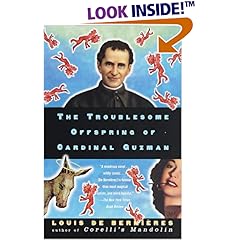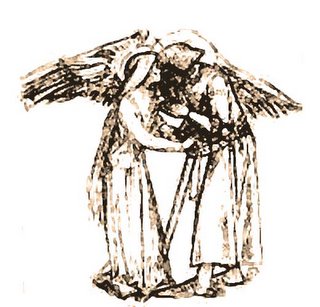
| I am currently reading Louis de Bernieres’ The Troublesome Offspring of Cardinal Guzman. From the back cover’s description of the book, I figured it fit the “magic realism” category, which is a much debated category. Since I had not read much South American writing [other than Jorge Borges], I thought the book sounded interesting.
|
If you are not aware of the term "magic realism" this quote from
http://www.themodernword.com/gabo/gabo_mr.html might help:
Literature of this type is usually characterized by elements of the fantastic woven into the story with a deadpan sense of presentation. The term is not without a lot of controversy, however, and has come under attack for numerous reasons. Some claim that it is a postcolonial hangover, a category used by "whites" to marginalize the fiction of the "other." Others claim that it is a passé literary trend, or just a way to cash in on the Latin American "boom." Still others feel the term is simply too limiting, and acts to remove the fiction in question from the world of serious literature.
De Bernieres' book is structured into fairly short chapter vignettes told by different narrators and with different perspectives. The book chronicles the people of Cochadebajo de los Gatos, an Andean village where everyone reads books and has pet jaguars, a 300-year old man can pass through searching for the beast who is a shape-changer, a Conquistador can be brought back to life from being frozen in ice and end up living in the same town as his descendant, the people can construct Utopian projects, and the oppressive Church and State can constantly intrude on the lives of its peaceful natives.
The more I read, the closer I find De Bernieres to the world of Voltaire’s
Candide. Cochadebajo is a modern El Dorado whose people are threatened by the bigotry and insensitivity of both Church and State. Just as in
Candide, where a noble black slave can lose his limbs for trying to escape, here a woman who has actually spoken with the Virgin Mary [who tells her to stop overdoing it with the rosary and Hail Marys] can be persecuted and eventually martyred because of two condescending missionaries.
For me, one memorable vignette is a theological lesson taught by a defrocked priest [who can magically levitate as he preaches] about the creation of man. According to his story, Satan was the creator of the world, not God. God, he maintains, would not have created something as flawed as the world. So Satan sets about to populate his world by forming people out of clay. But he can’t animate them. God sends down his Angel Adam to see what Satan is up to. God warns Adam not to go to sleep or Satan will take his soul. Of course, that’s just what happens. So Satan takes the soul of the Angel Adam and puts it into the clay, making the first man. God then sends the Angel Eve down to check on Adam. She also loses her soul to the clay. So according to De Bernieres’ priest we all have the souls of angels inside of us struggling to escape here and return to Heaven where we belong. Don’t we all sometimes feel those wings pushing to get out?
If you liked the irony and wisdom of
Candide, if you like a world where the magical can coexist with the mundane, if you are willing to think, you will probably enjoy this book.
De Bernieres, Louis. The Troublesome Offspring of Cardinal Guzman. New York: Vintage International, 1992.
 The picture at left is based on a sketch by Dante Gabriel Rossetti of angel and knight.
The picture at left is based on a sketch by Dante Gabriel Rossetti of angel and knight.Daniel Chester French, The Angel of Death and the Sculptor, 1889

